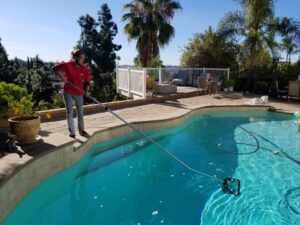As a swimming pool service technician, conducting a comprehensive swimming pool inspection for potential homebuyers is a crucial service that can significantly influence their purchasing decisions. This type of inspection, akin to a home inspection conducted by a home inspector, focuses on assessing the condition, safety, and operation of a home’s swimming pool to identify any potential issues before the sale is finalized. Here’s a guideline on how to perform these inspections effectively.
Understanding the Scope of the Swimming Pool Inspection
Your inspection should be as thorough as possible, covering all visible and operational aspects of the swimming pool and its equipment.
This includes:
Interior Finish Materials: Check for signs of wear or damage, such as cracking, peeling, or discoloration.
Decks, Steps, and Coping: Look for safety hazards like sharp edges, loose materials, or trip hazards.
Equipment Check: Assess pumps, motors, blowers, skimmers, filters, drains, heaters, and automatic safety controls for any signs of malfunction or damage.
Electrical Components and Safety Features: Test lights and ground fault circuit interrupters (GFCIs) and inspect handrails, ladders, safety barriers, and alarms.
Surrounding Area: Evaluate vegetation, grading, surface drainage, and retaining walls for potential adverse effects on the pool or spa structure.

EXAMPLE: Visual Inspection of the Swimming Pool/Spa
Note: the following example inspection is not all-inclusive
1. Interior Finish Materials: Examine the visible parts of the pool’s interior finish. Look for signs of wear, cracking, discoloration, or peeling, which could indicate water chemistry imbalances or structural issues.
2. Decks, Steps, and Coping: Check the condition of decks, steps inside the pool/spa shell, and coping. Ensure there are no trip hazards, sharp edges, or loose materials that could pose safety risks.
3. Pumps, Motors, and Blowers: Assess the visible parts of pumps, motors, and blowers for signs of corrosion, leaks, or unusual noises. Verify that they are securely mounted and that their housings are intact.
4. Skimmer, Filters, and Drains: Inspect skimmers for blockages, filters for appropriate pressure levels, and drains for clear flow paths. Ensure drain covers are securely fastened and comply with safety standards to prevent entrapment.
5. Heaters and Automatic Safety Controls: Evaluate heaters for external damage and signs of leakage. Check automatic safety controls for proper operation.
6. Gauges and Visible Piping: Verify that gauges are within operational ranges and that visible piping and valves show no signs of leakage or damage.
7. Electrical Components: Test the operation of readily accessible lights, ground fault circuit interrupters (GFCIs), and timer assemblies. Ensure external bonding of pump motors, blowers, and heaters is present and correct.
8. Handrails and Ladders: Examine permanently installed handrails and ladders for stability and signs of corrosion.
9. Safety Barriers and Alarms: Confirm the presence and adequacy of safety barriers and alarms to prevent unauthorized access to the pool/spa.
10. Entrapment Prevention Components: Check for features designed to prevent limb entrapment and ensure they are in working order.
11. Surrounding Area: Assess vegetation, grading, surface drainage, and retaining walls for potential adverse effects on the pool/spa structure.

Description and Operation
Type of Swimming Pool/Spa: Identify whether it’s an in-ground, above-ground, commercial, residential, spa, or other.
Interior Finish Materials: Note the materials used (plaster, tile, fiberglass, etc.) and their condition.
Type of Filter: Specify the filter type (sand, cartridge, diatomaceous earth) and assess its condition.
Types of Safety Barriers: Describe the barriers in place (fencing, covers, alarms) and their effectiveness.
Type of Cleaning System: If present, identify the cleaning system used (manual, automatic, robotic) and its operational status.
Energy Source for Heater: Note the energy source (gas, electric, solar) for the heater and inspect its condition.
Operation of Systems: Use normal operating controls to operate the systems and open readily openable access panels for a closer inspection.
Errors and Omissions Insurance
Before conducting any inspections, ensure you have Errors and Omissions (E&O) insurance. This coverage is essential as it protects you and your clients against the financial consequences of any oversight or mistake during the inspection process. Confirming your current insurance provides peace of mind to you and your clients.
Checking Local Regulations
Regulations regarding swimming pool inspections can vary by location. It’s recommended to check with local authorities to determine if specific requirements or licensing are needed to conduct legitimate pool inspections in your area. Compliance with these regulations ensures the legality of your service and enhances your credibility as a technician.
While performing the swimming pool inspection, you’ll need to:
Describe the Pool/Spa: Identify the type (e.g., in-ground, above-ground), interior finish materials, type of filter, types of safety barriers, cleaning system, and heater energy source.
Operate the Systems: Use normal operating controls to run the systems. Open readily openable access panels for a closer inspection where necessary.
Communicating Findings
After completing the inspection, compile your findings into a comprehensive report. This report should detail the condition of each component inspected, highlight any issues or potential concerns, and include recommendations for repairs or further evaluation by specialists if needed.
Limitations of the Inspection
Be clear about the limitations of your inspection. It’s essential to communicate to the potential buyer that the examination does not cover:
Testing under adverse weather conditions or evaluating components not accessible through regular operation.
Water chemistry, clarity, or the interior of filters.
Structural integrity assessments or suitability for specific activities.
Similar Article: Here’s why Home Inspectors should NOT inspect swimming pools
Legal
Consulting an attorney is a prudent step for a pool technician considering offering swimming pool inspection services, especially when embarking on this venture as a part of their business.
- Legal Guidance on Regulations: An attorney can provide valuable advice on local, state, and federal regulations that govern swimming pool inspections. This includes understanding specific certifications or licenses required to legally conduct these inspections in your area.
- Errors and Omissions Insurance: While Errors and Omissions (E&O) insurance is crucial, navigating the terms and ensuring adequate coverage can be complex. An attorney can help review or recommend insurance policies that adequately protect against potential liabilities.
- Contract Development: Offering professional inspection services involves entering into contracts with homebuyers or real estate agents. An attorney can assist in drafting or reviewing service contracts to ensure they are legally sound, clear, and protect your interests. This includes detailing the scope of the inspection, limitations, and terms of service.
- Risk Management: An attorney can advise on risk management strategies to minimize legal exposure. This encompasses guidance on how to communicate findings responsibly, handle disputes, and manage customer expectations effectively.
- Business Structure: If you’re expanding your services to include pool inspections, an attorney can advise on the best business structure (e.g., sole proprietorship, LLC, corporation) for liability protection and tax purposes.
- Intellectual Property and Marketing: As you develop your business, protecting your brand and marketing legally is important. An attorney can guide on copyright, trademarks, and advertising regulations to ensure your promotional efforts comply with legal standards.
Consulting an attorney can provide crucial legal insight and support, helping to establish a solid foundation for your pool inspection venture, safeguard against potential legal issues, and ensure compliance with all relevant regulations.
Swimming Pool Inspections
Conducting swimming pool inspections for potential homebuyers is a valuable service that requires attention to detail, thorough knowledge of pool systems, and an understanding of local regulations. You can provide a crucial homebuying service by providing a detailed report, ensuring you have the appropriate E&O insurance, and communicating effectively with your clients. This helps potential buyers make informed decisions and positions you as a trusted and reliable resource in the pool service industry.






